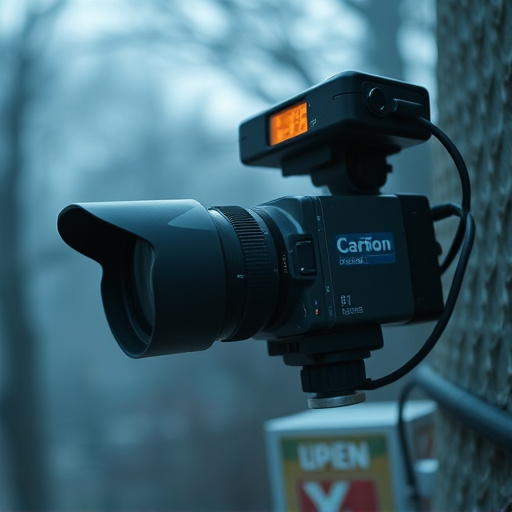Battery-powered spy cameras disguised as everyday items have transformed outdoor surveillance, offering high-definition video, motion detection, and real-time access via mobile apps. While providing enhanced security and peace of mind, their discreet nature raises legal and ethical concerns regarding privacy. Responsible use requires understanding local laws, transparency, and prioritizing ethical practices to maintain a harmonious balance between security and individual rights.
“Uncover the world of miniature surveillance with battery-powered spy cameras—a growing trend in home security. These tiny, discreet devices offer unprecedented peace of mind, integrating seamlessly into everyday objects like never before. From outdoor sensors to cleverly disguised indoor gadgets, this technology is revolutionizing privacy and monitoring.
Explore the creative disguises, legal implications, and technical aspects of battery-powered spy cameras as we delve into their impact on modern homes, ensuring a comprehensive understanding of this innovative yet controversial topic.”
- Understanding Battery-Powered Spy Cameras: Unveiling the Technology
- Integrating Miniatures into Everyday Home Objects: Creative Disguises
- Legal and Ethical Considerations: Navigating Privacy Boundaries
Understanding Battery-Powered Spy Cameras: Unveiling the Technology
Battery-powered spy cameras, also known as outdoor surveillance cameras, have transformed home security with their discreet and versatile nature. These miniature devices are designed to blend seamlessly into everyday objects, offering a level of monitoring that was once unimaginable. Powered by rechargeable batteries, they can run for extended periods, capturing high-definition footage and providing real-time alerts via mobile apps.
The technology behind these cameras is sophisticated yet user-friendly. They often incorporate advanced sensors, such as motion detectors and low-light photography capabilities, ensuring optimal performance in various conditions. With wireless connectivity, users can remotely access live feeds or recorded videos from their smartphones, offering peace of mind while also empowering them to take proactive measures for home security and safety.
Integrating Miniatures into Everyday Home Objects: Creative Disguises
In an era where technology continues to shrink, miniature surveillance devices find their place in our homes through cleverly disguised everyday objects. These tiny cameras, often powered by a simple battery, can be seamlessly integrated into various items we already own, offering unparalleled discretion for home security and monitoring. From a seemingly innocuous-looking potted plant that secretly records activity outside to a vintage-style light bulb housing a spy camera, these creative disguises make surveillance nearly untraceable.
The beauty of battery-powered outdoor cameras hidden in home objects lies in their ability to capture evidence without drawing attention. Whether placed in strategic locations indoors or outdoors, they provide peace of mind by offering a continuous watchful eye on spaces and activities. This innovative use of technology in everyday items has transformed the way we approach home security, ensuring that potential threats are documented and addressed efficiently.
Legal and Ethical Considerations: Navigating Privacy Boundaries
The integration of miniature surveillance devices into everyday home objects raises significant legal and ethical questions, particularly concerning privacy boundaries. As technology advances, small, battery-powered spy cameras like those designed for outdoor use become increasingly accessible, blurring the lines between security measures and potential invasions of personal space. On one hand, these devices offer homeowners enhanced safety and peace of mind, allowing them to monitor their properties remotely. However, their discreet nature can facilitate a breach of privacy if not used responsibly or within legal frameworks.
Navigating this complex landscape requires a delicate balance between individual rights and the need for security. Legal considerations vary across jurisdictions, but many countries have specific regulations governing surveillance technology, especially when it comes to hidden cameras. Ethical guidelines emphasize transparency, consent, and respect for personal privacy. Homeowners utilizing battery-powered spy cameras outdoors must be mindful of placement, ensuring they do not infringe upon neighbors’ privacy or capture areas considered private spaces. Responsible use involves understanding local laws, being open about the presence of surveillance devices, and prioritizing ethical practices to maintain a harmonious community.
Miniature surveillance devices, such as battery-powered spy cameras, offer both innovative solutions for home security and complex ethical dilemmas. As these tiny technologies become more sophisticated and integrated into everyday objects, understanding their potential applications and privacy implications is essential. While they provide advanced outdoor monitoring capabilities, users must navigate legal boundaries and respect personal privacy to ensure a safe and ethical use of these devices.
